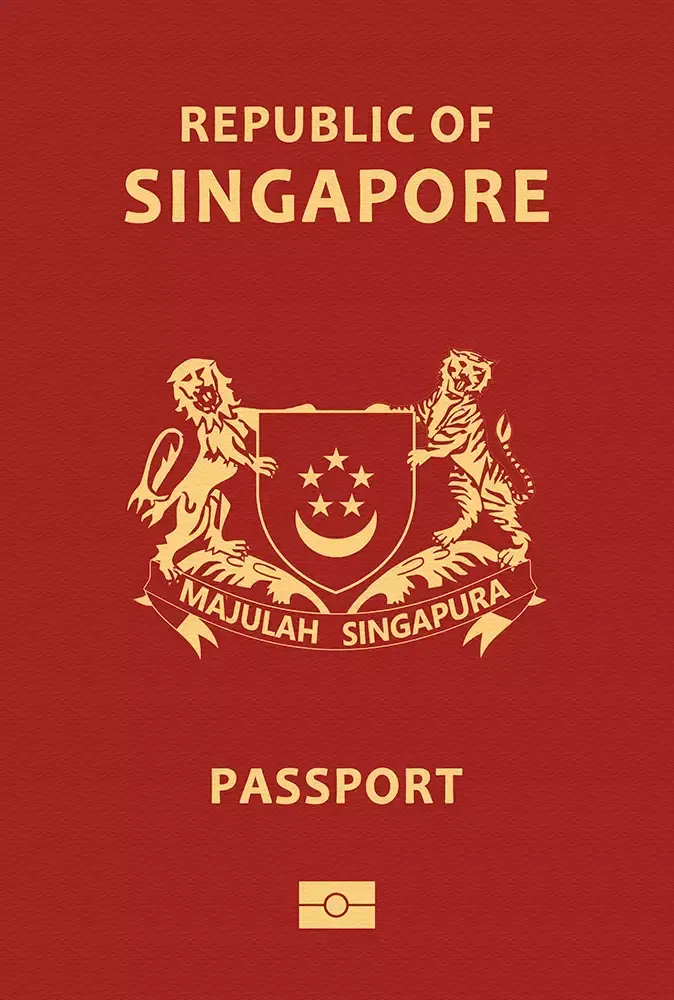Singapore passport ranking solidifies its position as one of the most powerful passports in the world, asserting its dominance in the 2024 Henley Passport Index. With the ability to travel visa-free to 193 countries, Singapore once again takes the lead among global passport power rankings. This prestigious ranking not only reflects Singapore’s robust diplomatic relationships but also emphasizes its significance as an international travel hub. The competitive landscape of passport rankings showcases the evolution of global mobility, with countries like Japan, Germany, and Italy also performing strongly. As travelers increasingly seek freedom of movement, the Singapore passport exemplifies the pinnacle of passport strength in the current global passport index.
Exploring the realm of global mobility, the Singaporean travel document has reaffirmed its status as the foremost in the world, boasting unmatched access to numerous visa-free countries. Its supremacy, recognized in the latest international passport rankings, highlights the strategic global relationships cultivated by Singapore. In 2024, this prestigious passport led the way, alongside other powerful documents from nations like Japan and Germany, indicating remarkable passport strength and value. The Henley Passport Index serves as a crucial metric for assessing the freedom of travel afforded by each passport, shedding light on how travel capabilities can shape global dynamics. As mobility becomes increasingly essential in our interconnected world, the insights from such international rankings become vital for travelers and policymakers alike.
Singapore Passport Ranking: The World’s Strongest Passport in 2024
According to the latest Henley Passport Index, Singapore continues its reign as the holder of the world’s strongest passport in 2024. This prestigious title is earned by allowing its citizens access to an impressive 193 destinations globally without the need for prior visa arrangements. This remarkable achievement underscores Singapore’s robust diplomatic ties and favorable international agreements, making it the most powerful passport as recognized by global passport index standards.
The new ranking positions Singapore at the forefront of passport power rankings, alongside notable counterparts like Japan, Germany, and Italy. These countries, while also enjoying substantial travel freedoms, cannot surpass Singapore’s leading score. As passport power becomes an increasingly valued asset in today’s interconnected world, Singapore continues to showcase its global status through such accolades, bolstering its image as a prime destination for professionals and tourists alike.
Understanding the Henley Passport Index and Its Significance
The Henley Passport Index generates insights into the freedom passport holders experience when traveling internationally. It employs data from the International Air Transport Association to provide an accurate count of how many countries a passport grants access to without a prior visa. The integrity of this ranking continues to play a crucial role in the discourse around passport power and global mobility, shedding light on shifts in travel freedom year by year.
In addition to offering a ranking, the Henley Passport Index highlights trends that can influence diplomatic relations and global travel norms. The fluctuations in positions among passports indicate political changes, economic stability, and bilateral agreements that may evolve over time. Monitoring these dynamics helps aspiring travelers and policymakers alike understand the broader implications of passport mobility across the globe.
The Benefits of Holding a Strong Passport: Travel Opportunities
Holding a strong passport like Singapore’s not only eases travel logistics but also enhances opportunities for international career advancement and exploration. With visa-free or visa-on-arrival access to 193 countries, Singaporean passport holders can travel to some of the most sought-after destinations worldwide without the inconveniences associated with visa applications. This level of accessibility simplifies plans for business trips, vacations, and cultural exchanges.
Moreover, traveling with a strong passport often leads to a more seamless experience at borders and can sometimes yield additional perks, such as expedited immigration processes and lower security wait times. This enhances the overall travel experience, enabling passport holders to maximize their time in different locations, whether for leisure or business. Ultimately, the strength of a passport plays a key role in facilitating global mobility and enriching personal and professional journeys.
The Impact of Passport Rankings on Global Perception
Passport rankings, such as those provided by the Henley Passport Index, can significantly impact how countries are perceived on the global stage. A high-ranking passport symbolizes not only the freedom of movement for its holders but also reflects the nation’s international reputation, diplomatic robustness, and economic standing. Countries like Singapore leverage their strong passport rankings to attract foreign investment and tourism, projecting a stable image to potential international partners.
Conversely, countries with lower rankings, such as Afghanistan, experience heightened challenges regarding international relations and mobility. Such passports often limit the travel opportunities for citizens, which can stifle economic growth and access to global opportunities. This disparity in passport power serves as a reminder of how interconnected geopolitics is with individual freedom and rights, influencing public perception and national pride across different regions of the world.
Trends and Changes in Visa-Free Access for Global Passports
The landscape of visa-free access is in constant flux, shaped by geopolitical changes, bilateral negotiations, and global events. In 2024, for instance, notable movements include the rise of India’s passport to 77th position in global rankings, showcasing a significant improvement in the country’s diplomatic engagement and international relations. Each rank change demonstrates the evolving dynamics of passport power and the ongoing effort by nations to enhance their global mobility.
Furthermore, emerging economies such as the UAE have shown remarkable progress, breaking into the top ten rankings within a mere decade. The UAE’s strategy of building strong diplomatic ties and enhancing its global tourism sector has contributed to this upward trajectory. Analyzing these trends reveals how countries are prioritizing passport strength as a crucial aspect of their international strategy, ultimately affecting individual citizens’ ability to travel with ease.
Factors Affecting Passport Strength and Rankings
The ranking of passports is influenced by various factors including the number of countries allowing visa-free access, the political stability of the issuing country, and its diplomatic relationships worldwide. For example, nations that engage in numerous bilateral agreements tend to have stronger passports as their citizens enjoy greater travel freedom. Singapore exemplifies this approach with its proactive foreign policy, resulting in enhanced passport strength and security for its citizens.
Additionally, the strength of a nation’s economy often correlates with its passport ranking; stronger economies tend to negotiate better travel agreements. The Henley Passport Index illustrates these complexities by displaying how economic policies and international relationships influence the mobility of citizens. Therefore, the interplay between diplomatic engagement, economic stability, and international collaboration remains pivotal in shaping the landscape of global passport rankings.
Comparative Analysis of Top Passports: A Regional Focus
When analyzing the top passports globally, it is essential to consider regional dynamics, specifically how Asian passports like those of Singapore, Japan, and South Korea have surged ahead of traditional Western powerhouses. The current ranking indicates a shift in global influence as these Asian nations prioritize international relations, contributing to enhanced passport effectiveness and accessibility for their citizens.
Conversely, Western nations like the United States and the United Kingdom have faced declines in their passport rankings, reflecting the long-term implications of current geopolitical policies. This comparative analysis is crucial for understanding how regional strength plays a fundamental role in diplomatic relations and global mobility, further influencing individual experiences when traveling internationally.
The Future of Passport Rankings: Emerging Trends to Watch
As we look toward the future, several emerging trends will reshape passport rankings and global mobility. Increased digitalization and the adoption of technology in passport management may lead to more streamlined processes and greater accessibility. Furthermore, evolving diplomatic relations in response to global challenges, such as economic downturns and health crises, can significantly influence visa agreements and access.
In light of these trends, countries will need to adapt their strategies to maintain or improve their ranking in the Henley Passport Index. This includes prioritizing international cooperation and address barriers to travel that may arise. As nations grapple with such challenges, the dynamics of passport power will continue to evolve, creating an ever-changing landscape for citizenship and mobility around the world.
The Diplomatic Efforts Behind Strong Passports
Strong passports are often a result of careful diplomatic efforts and strategic international policies. Countries like Singapore invest in building relationships through trade agreements, cultural exchanges, and regional collaborations. Such diplomatic initiatives enhance their standing in global affairs, leading to improved access for their passport holders. The strong passport ranking reflects years of foresighted diplomacy that prioritizes the interests of its citizens in terms of international mobility.
Moreover, nations that achieve strong passport rankings typically focus on strengthening their global presence through participation in international organizations, summits, and multilateral forums. This proactive approach allows them to influence global policies and negotiate favorable travel agreements, ensuring their passports maintain a competitive edge. This interplay between diplomacy and passport power showcases how vital international relations are in shaping global passport rankings.
Frequently Asked Questions
What is the current Singapore passport ranking according to the Henley Passport Index?
As of the latest Henley Passport Index, Singapore holds the title of the strongest passport in the world for 2024, granting visa-free access to 193 countries.
How does Singapore’s passport ranking compare to Japan and Germany?
Singapore retains the top spot in passport power rankings, with Japan and Germany placed in a tie for second place in the recent Henley Passport Index.
How many visa-free countries can Singapore passport holders access?
Singaporean passport holders can travel to 193 countries without requiring a prior visa, solidifying its status as the world’s strongest passport in 2024.
Which countries share the third position in the Henley Passport Index rankings?
Countries sharing the third position in the latest passport power rankings include France, Germany, Denmark, Finland, Italy, Ireland, and Spain.
What are the recent trends observed in the passport rankings of the United States and United Kingdom?
The United States has fallen to 10th place in the Henley Passport Index, while the United Kingdom dropped to 6th place, indicating a declining trend for these once powerful passports.
How does the Henley Passport Index determine passport rankings?
The Henley Passport Index ranks global passports based on the number of destinations accessible without a visa, using data from the International Air Transport Association.
What significant achievement does the UAE passport hold in the Henley Passport Index?
The UAE passport is notable for breaking into the top 10 and has climbed 34 places over the past decade in the global passport index.
What was India’s passport ranking improvement in the latest Henley Passport Index?
India’s passport significantly improved its standing, rising from 85th to 77th position, marking the most notable jump in the ranking according to Henley & Partners.
How has the Henley Passport Index rankings impacted global travel accessibility?
The Henley Passport Index highlights the travel accessibility of various nationalities, with Singapore’s passport enabling entry to 193 countries, thus offering its holders extensive international mobility.
What implications does Singapore’s ranking have for its citizens in terms of travel?
With the Singapore passport ranking as the strongest in 2024, citizens enjoy unparalleled travel freedom and access to numerous countries without visa restrictions, enhancing global travel opportunities.
| Position | Country | Visa-Free Access |
|---|---|---|
| 1 | Singapore | 193 |
Summary
The Singapore passport ranking firmly upholds its position as the strongest passport in the world, allowing holder access to 193 countries without a prior visa. This impressive feat highlights Singapore’s robust global standing and reflects the economic and diplomatic prowess of the nation. As other countries fluctuate in their standings, Singapore remains a beacon of travel freedom, influencing international travel dynamics.



